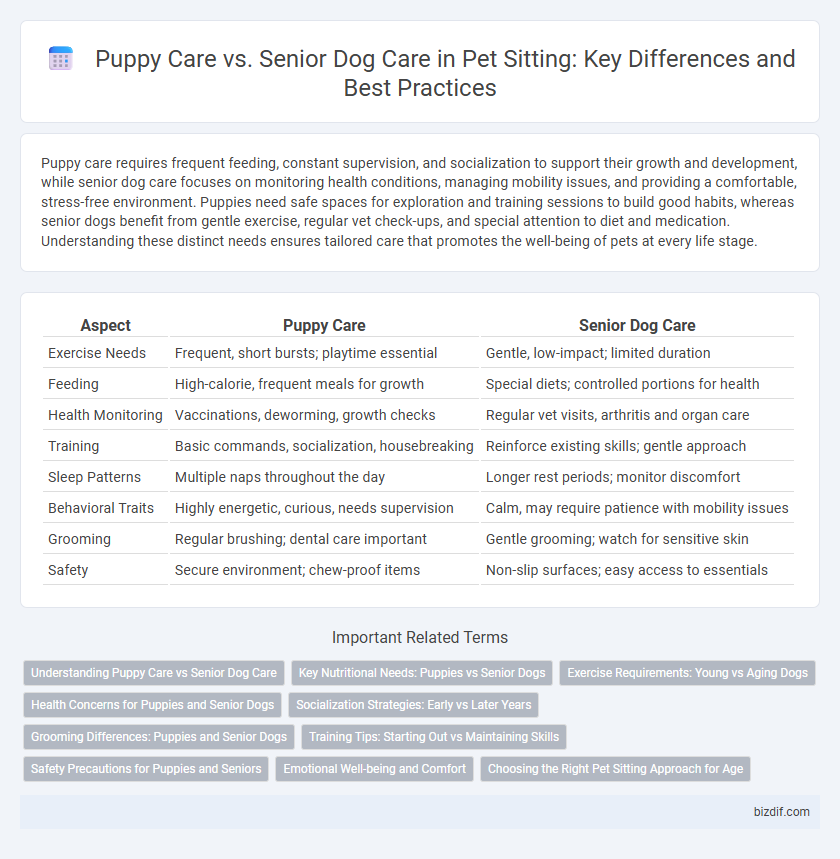Puppy care requires frequent feeding, constant supervision, and socialization to support their growth and development, while senior dog care focuses on monitoring health conditions, managing mobility issues, and providing a comfortable, stress-free environment. Puppies need safe spaces for exploration and training sessions to build good habits, whereas senior dogs benefit from gentle exercise, regular vet check-ups, and special attention to diet and medication. Understanding these distinct needs ensures tailored care that promotes the well-being of pets at every life stage.
Table of Comparison
| Aspect | Puppy Care | Senior Dog Care |
|---|---|---|
| Exercise Needs | Frequent, short bursts; playtime essential | Gentle, low-impact; limited duration |
| Feeding | High-calorie, frequent meals for growth | Special diets; controlled portions for health |
| Health Monitoring | Vaccinations, deworming, growth checks | Regular vet visits, arthritis and organ care |
| Training | Basic commands, socialization, housebreaking | Reinforce existing skills; gentle approach |
| Sleep Patterns | Multiple naps throughout the day | Longer rest periods; monitor discomfort |
| Behavioral Traits | Highly energetic, curious, needs supervision | Calm, may require patience with mobility issues |
| Grooming | Regular brushing; dental care important | Gentle grooming; watch for sensitive skin |
| Safety | Secure environment; chew-proof items | Non-slip surfaces; easy access to essentials |
Understanding Puppy Care vs Senior Dog Care
Puppy care requires frequent feeding schedules, socialization, and consistent training to support growth and behavior development, while senior dog care focuses on managing age-related health issues, including arthritis and mobility challenges. Nutritional needs differ significantly: puppies need high-protein diets rich in essential nutrients, whereas seniors benefit from specialized diets tailored to maintain weight and support organ health. Monitoring activity levels and providing age-appropriate exercise routines are crucial in both cases to ensure well-being and prevent stress or injury.
Key Nutritional Needs: Puppies vs Senior Dogs
Puppies require a diet rich in protein, calcium, and essential fatty acids to support rapid growth, brain development, and strong bones, typically found in puppy-specific formulations high in calories and nutrients. Senior dogs need lower-calorie meals with added fiber, joint-supporting supplements like glucosamine, and antioxidants to maintain weight, digestive health, and reduce inflammation associated with aging. Tailoring pet sitting nutritional plans to these distinct life stages ensures optimal health and wellbeing for both puppies and senior dogs.
Exercise Requirements: Young vs Aging Dogs
Puppies require frequent, short bursts of exercise to support their rapid growth and high energy levels, while senior dogs benefit from moderate, low-impact activities tailored to their reduced stamina and joint health. Young dogs thrive on play sessions that encourage socialization and muscle development, whereas aging dogs need gentle walks to maintain mobility and prevent stiffness. Adapting exercise routines to a dog's life stage is crucial for promoting overall well-being and preventing injury.
Health Concerns for Puppies and Senior Dogs
Puppy care requires vigilant monitoring for common health concerns like parvovirus, worm infestations, and vaccination schedules to ensure proper immune system development. Senior dog care focuses on managing age-related issues such as arthritis, dental disease, and declining organ function, necessitating tailored diets and regular veterinary checkups. Both stages demand attentive observation to promptly address symptoms and maintain overall well-being.
Socialization Strategies: Early vs Later Years
Puppy care requires intensive socialization strategies involving frequent exposure to diverse people, animals, and environments to promote confident, well-adjusted behavior. Senior dog care emphasizes gentle, consistent social interactions tailored to existing comfort levels and potential sensory or mobility limitations. Effective pet sitting adapts socialization techniques to developmental stages, ensuring puppies build foundational social skills while senior dogs maintain mental stimulation and emotional well-being.
Grooming Differences: Puppies and Senior Dogs
Puppy grooming focuses on gentle brushing to manage shedding and introduce coat care, while avoiding harsh products that may irritate sensitive skin. Senior dog grooming requires attention to thinner, more fragile skin, with careful nail trimming and ear cleaning to prevent infections. Both age groups benefit from regular grooming sessions tailored to their specific coat conditions and health needs.
Training Tips: Starting Out vs Maintaining Skills
Puppy care in pet sitting emphasizes consistent training sessions to establish basic commands and socialization early, leveraging positive reinforcement techniques to build foundational skills. Senior dog care focuses on maintaining existing skills through gentle repetition and patience, adapting training methods to accommodate slower learning and potential cognitive decline. Tailoring training approaches to age ensures effective communication and enhances the overall well-being of both puppies and senior dogs.
Safety Precautions for Puppies and Seniors
Puppy care requires close monitoring to prevent choking hazards from small toys and frequent supervision during playtime to avoid injury, while senior dog care focuses on managing arthritis and mobility issues by providing non-slip surfaces and avoiding strenuous activity. Both require secure environments; puppies need containment to prevent escape or ingestion of harmful substances, whereas seniors benefit from easy access to food, water, and resting areas to minimize stress. Tailoring safety precautions to the dog's life stage reduces accident risks and supports overall health during pet sitting.
Emotional Well-being and Comfort
Puppy care emphasizes socialization and emotional security through gentle handling and consistent routines, fostering confidence and reducing anxiety. Senior dog care prioritizes comfort by accommodating mobility issues, providing soothing environments, and maintaining emotional stability with familiar scents and gentle affection. Tailoring care to each life stage optimizes emotional well-being and ensures a nurturing pet sitting experience.
Choosing the Right Pet Sitting Approach for Age
Puppy care requires frequent feeding, socialization, and gentle supervision to support growth and training, while senior dog care focuses on mobility assistance, managing health issues, and providing comfort. Tailoring pet sitting services to the dog's life stage ensures optimal well-being, addressing specific nutritional needs and activity levels. Choosing the right pet sitting approach for age enhances the pet's quality of life and promotes a stress-free experience.
Puppy care vs Senior dog care Infographic

 bizdif.com
bizdif.com